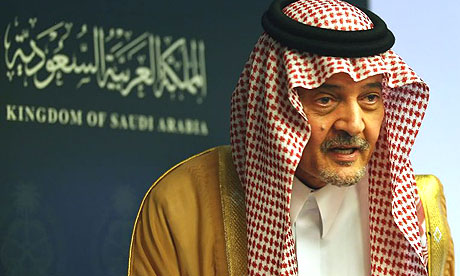Leaked notes provide rare insight into Saudi Arabia's trenchant but pragmatic approach to the Israeli-Palestinian conflict, writes Ian Black
- Ian Black
- Saturday May 10 2008

Saudi Foreign Minister, Saud al-Faisal.
Prince Saud al-Faisal has been the discreet voice of Saudi Arabian diplomacy for more than 30 years, and he spoke with unchallenged authority at the recent meeting of the Quartet of Middle East peacemakers, giving what turned out to be a bleak assessment of the current negotiations between Israel and the Palestinians. The situation was "dire", he told the assembled dignitaries, including Condoleezza Rice, Tony Blair and Ban Ki-moon. "Many dangers loom. It seems we have reached a stage that I can only describe as a morass."
Such pessimism is not big news, though Saud's gloomy remarks were made, characteristically, behind closed doors at London's Lancaster House. It is certainly hard to find anyone who harbours much hope that there is a way out of the current impasse.
With Israel celebrating its 60th independence day, divided Palestinians marking their 1948 "nakba" or catastrophe and George Bush heading for what looks like yet another content-free visit to the region, prospects for the peace talks launched at Annapolis last November range from poor to non-existent.
The conservative, oil-rich kingdom is not a frontline state in the Arab conflict with Israel and it has no territorial quarrel with it. It is Washington's closest ally in the Arab world and drew up the groundbreaking Arab League initiative, which states unequivocally that peace with Israel is a "strategic choice" and which was reaffirmed at last year's Riyadh summit. The Saudis lead the camp of pro-western Sunni Arab states alarmed by the outcome of the war in Iraq and Iran's newly assertive role in the region. Two of its closest allies, Egypt and Jordan, already have peace treaties with the Jewish state. The Saudis brokered the agreement between the Palestinian Authority and the Islamists of Hamas, which collapsed in acrimony under US-Israeli pressure, prompting the Hamas takeover of the Gaza Strip. On a previous visit to London, Saud told journalists that the Israel-Palestinian conflict was a "border dispute", a remarkably low-key description.
Doubts notwithstanding, the Saudis have quietly supported the search for Israeli-Palestinian peace. Saud went to Annapolis on a promise that the Maryland summit would be more than just another photo-opportunity. David Milliband, Britain's foreign secretary, flew to Riyadh earlier this month to ensure that the prince would also attend the London Quartet meeting, which was held on a glorious early summer day at one of the British government's most splendid official residences.
Diplomats say that Saud's remarks, obtained by the Guardian, were motivated in part by irritation at Washington's insistence that its wealthy Arab allies were not providing sufficient financial support for the Palestinian Authority, as Rice complained.
Reproduced here, they provide rare insight into how this key Arab country perceives the conflict with Israel, the complexity of Middle East peace-making — and some thoughts on the way out.
The Saudi view is that the dispute could be resolved in a straightforward way on the basis of existing UN resolutions (and the principle of the inadmissibility of acquiring land by force), but that "many unrelated and superfluous elements" have been injected into the search for a solution. There were three inter-related reasons for this, Saud said:
"The apparent insistence of Israel on carving a state exclusively for the Jewish people on a land that has been inhabited by the Palestinians. This inevitably led to the expulsion of the bulk of the original inhabitants and threatened the rest of the Palestinians with the same fate. Conflict was bound to happen, as a result of which the Palestinians were denied their rights and continue to suffer brutalising and demeaning abuse under a state of denial and deprivation.
"The continued exercise by Israel of the policy that is based on the need to achieve absolute security for the Jewish state ... Absolute security for one country in a dispute of this nature means absolute insecurity for the other country.
"Widespread anti-Semitism in the west, and the ensuing holocaust perpetrated on the Jews, which justifiably generated great sympathy in the west and the rest of the world, resulted unfortunately in the state of Israel being given a license to use any policy it chooses even though it leads to perpetuating injustice on the Palestinian people while Israel continues to be perceived as a peace-loving state despite its warlike policies and practices. Furthermore, the Israeli-Palestinian problem became part and parcel of internal domestic issues in Europe and the United States, which aggravated the complication further and justified any action taken by Israel, no matter how illegal or outrageous. These perceptions replaced rational objectivity by emotional subjectivity."
Saud was not seeking "recrimination," he insisted, but he urged the Quartet to find a way out of the deadlock. An "honest and serious" approach could remove most of the "current complexity," he suggested.
"The security of Israel can best be served by the establishment of a viable Palestinian state living side-by-side with Israel, which would make the Palestinian state a responsible and accountable member of the world community."
The prince also attacked "continued efforts to divide the Palestinians rather than work assiduously towards uniting them behind the peace process". He refrained from directly accusing the US and EU of backing Israel in its attempt to isolate Hamas, but made it clear that Palestinian unity was a prerequisite for peace.
"We sincerely believe that there is an absolute need to effect change in the approach of the Quartet and introduce a shift in its focus. The focus should not be on stipulating conditions that cannot be fulfilled, but rather on creative suggestions that would help move things forward."
.
No comments:
Post a Comment